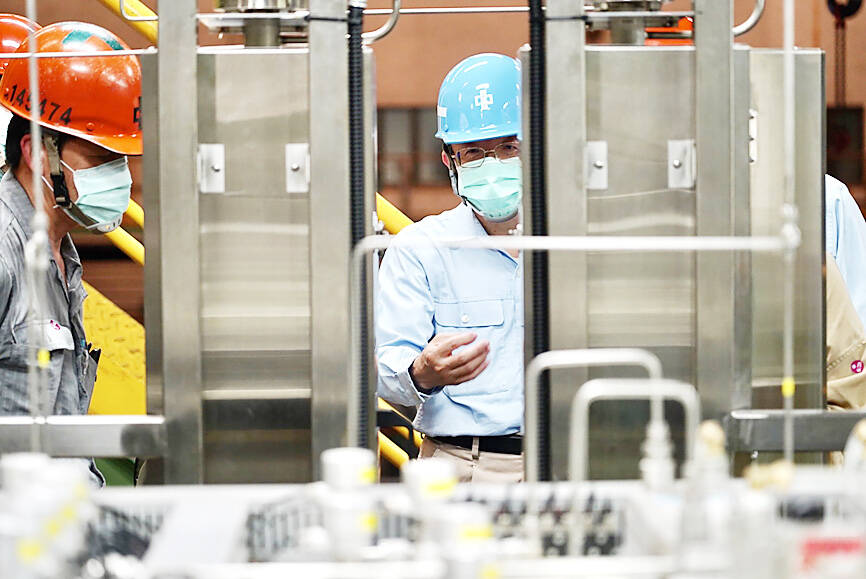China Steel Corp (中鋼) yesterday said it would raise the prices of hot-rolled plate and cold-rolled coils, which are commonly used in construction and auto manufacturing, by NT$500 per tonne for domestic deliveries next month, ending a three-month streak of price cuts.
Other steel products used in home appliances, computers and other applications would be flat, the company said in a statement.
Overall next quarter, steel prices for domestic deliveries would dip 0.83 percent on average sequentially, or a decline of NT$500 to NT$1,500 per tonne, due to inventory correction, the steelmaker said.

Photo: CNA
The Kaohsiung-based company said it took its cue from global peers, which have raised steel prices amid an improving industry outlook.
The global steel industry is on track to recover as China ditches its “zero COVID” policy and adopts new economic stimulus measures, including new investments on infrastructure, to help stimulate consumption and its economy, the company said.
An easing of the auto chip shortage has also led to an improvement in global auto sales, China Steel said in a statement.
Global supply has been falling, with crude steel production falling 3.9 percent year-on-year in the first 10 months of this year as steelmakers in the US and Europe stepped up output cuts, China Steel said, citing statistics from the World Steel Association.
China, which accounts for about half of the world’s apparent steel consumption, saw its steel inventory plunge 50 percent from this year’s peak, dropping to its lowest level in three years, the company said.
“That indicates inventory digestion in the world steel industry is nearing an end,” it said.
As the prices of iron ore and other commodities continue to hover at high levels, they have lent support to global steel prices, China Steel said.
“It is clear that global steel prices have hit the bottom and are ready to rebound,” it said.
Responding to improving market conditions, China’s major steelmakers started hiking hot-rolled steel for exports by US$30 per tonne, China Steel said.
Baowu Steel Group Ltd (寶武鋼鐵), the world’s biggest steelmaker, and Angang Steel Co (鞍山鋼鐵) have raised price quotes for some steel deliveries domestically next month by 50 yuan to 300 yuan (US$7.20 to US$43) per tonne, China Steel said.
US steelmakers took the lead by raising steel prices by US$66 per tonne last month and they are working on a second round of price increases, the company said.
European steelmakers are following suit and plan to increase prices by US$85 per tonne for deliveries in the first quarter, China Steel said.

TRADE WAR: Tariffs should also apply to any goods that pass through the new Beijing-funded port in Chancay, Peru, an adviser to US president-elect Donald Trump said A veteran adviser to US president-elect Donald Trump is proposing that the 60 percent tariffs that Trump vowed to impose on Chinese goods also apply to goods from any country that pass through a new port that Beijing has built in Peru. The duties should apply to goods from China or countries in South America that pass through the new deep-water port Chancay, a town 60km north of Lima, said Mauricio Claver-Carone, an adviser to the Trump transition team who served as senior director for the western hemisphere on the White House National Security Council in his first administration. “Any product going

High above the sparkling surface of the Athens coastline, the cranes for building the 50-floor luxury tower centerpiece of Greece’s future “smart city” look out over the Saronic Gulf. At their feet, construction machinery stirs up dust. Its backers say the 8 billion euro (US$8.43 billion) project financed by private funds is a symbol of Greece’s renaissance after the years of financial stagnation that saw investors flee the country. However, critics see it more as a future “ghetto for the rich.” It is hard to imagine that 10km from the Acropolis, a new city “three times the size of Monaco”

STRUGGLING BUSINESS: South Korea’s biggest company and semiconductor manufacturer’s buyback fuels concerns that it could be missing out on the AI boom Samsung Electronics Co plans to buy back about 10 trillion won (US$7.2 billion) of its own stock over the next year, putting in motion one of the larger shareholder return programs in its history. South Korea’s biggest company would repurchase the stock in stages over the coming 12 months, it said in a regulatory filing on Friday. As a first step, it would buy back about 3 trillion won of paper starting today up until February next year, all of which it would cancel. The board would deliberate on how best to effect the remaining 7 trillion won of buybacks. The move

In a red box factory that stands out among the drab hills of the West Bank, Chat Cola’s employees race to quench Palestinians’ thirst for local products since the Gaza war erupted last year. With packaging reminiscent of Coca-Cola’s iconic red and white aluminum cans, Chat Cola has tapped into Palestinians’ desire to shun brands perceived as too supportive of Israel. “The demand for [Chat Cola] increased since the war began because of the boycott,” owner Fahed Arar said at the factory in the occupied West Bank town of Salfit. Julien, a restaurateur in the city of Ramallah further south,